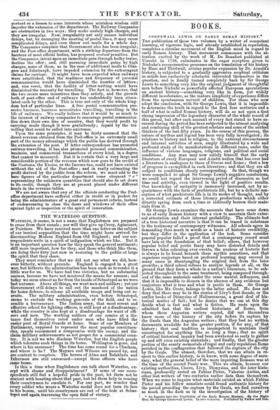THE WATERLOO QUESTION.
WATERLOO, it seems, is not a name that Englishmen are prepared to erase from their annals ; nor will they give up Crecy, Agincourt, or Poictiers. We have received more than one letter on the subject Of our ironical su. . .sition that the time might have arrived for disconnecting X ern England from Old England; and our cor- respondents write ip a spirit of indignation which we like. But it I an important question how far they speak the general sentiment; MI more important, how far they, and those who think like them, sere doing their duty just now in restoring to the public at large the spirit that they share. - They must remember that we did not say what we did, how- ever bitterly, without grounds. England is engaged in a great war, but hitherto the administration has been such as to render it a little war for us. We have had two victories, but no substantial success, because we have not mustered the means for success; and today we seem almost as far from the inside of Sebastopol as we were last autumn. Above all things, we want men and soldiers ; yet our Government still delays to call out the manhood of the nation for home defence, to release all available troops and bring out re- cruits. The military administration, even before Sebastopol, seems to exclude the working generals of the field, and to re- semble a bureaucracy. The Indian army, that most recent and effective school for fighting officers, is still kept at a disadvantage ; while the country is also kept at a disadvantage for want of offi- cers and men. The working soldiers of our armies at a dis- tance find themselves rated under men who have filled the easier post of Royal Guards at home. Some of our Members of Parliament, supposed to represent the most popular constituen- cies, openly recommend a compromise with the enemy, and dis- claim military achievements as not proper for a commercial coun, by. It is not we who disclaim Waterloo, but the English people which tolerates such things in its home. Wellington is gone, and where is his successor ? The time has come round for a Chatham, and where is he ? The Mertes and Wilsons are passed by, and tire content to complain. The heroes of Alma and Balaklava and Inkerman are still unreseued—except those officers who have Mite home.
Is this a time when Englishmen can talk about Waterloo, ex- empt with shame and disappointment? If some of our corre- spondents still feel a hopeful pride in the past, let them not be content with boasting about that past, bat let them help in rousing their countrymen to emulate it. For our part, we wonder that every soldier who wears a Waterloo medal does not tarn its face to his bosom, until his countrymen are out of the hole at Sebes- topol and again traversing the open field of victory.


























 Previous page
Previous page